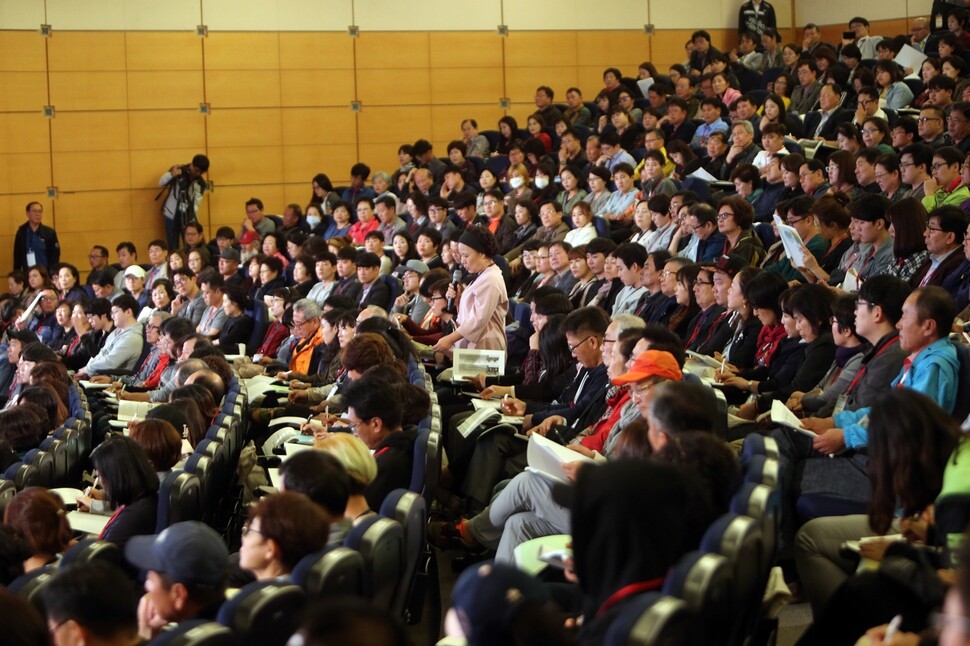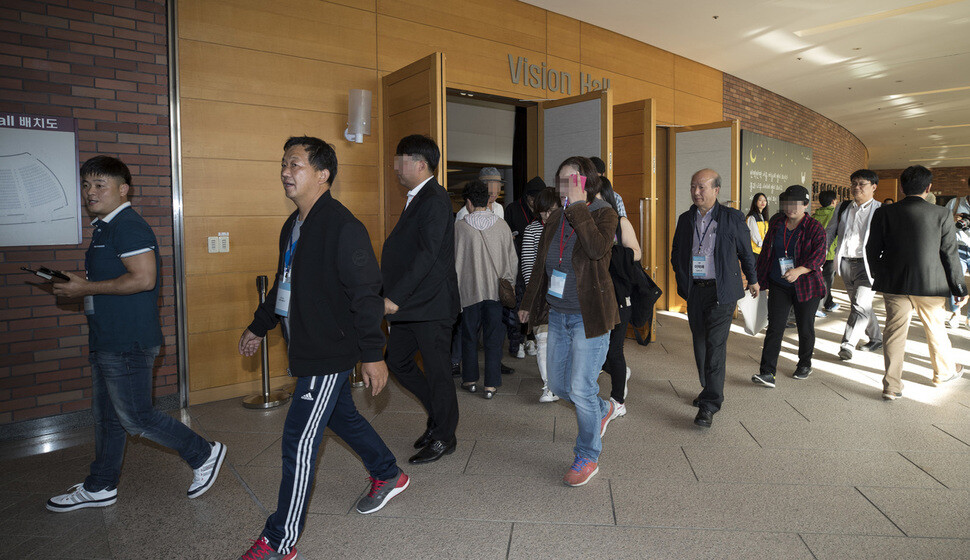hankyoreh
Links to other country sites 다른 나라 사이트 링크
Citizens leave Shin-Kori 5, 6 task force with positive impressions

“I also work in the nuclear power field, but the questions asked by the citizen task force were expert-level.” - Cha Wan-gyeong, 63
“There was a meaningful process, so I’ll be able to accept the conclusion, even if it’s not the one I wanted.” - Cho Won-yeong, 39
Citizen task force members appeared satisfied as they gathered at Kyobo Life Insurance’s Gyeseongwon training center in Cheonan, South Chungcheong Province, on Oct. 12 following a three-day debate camp on the question of whether to halt construction of the Shin-Kori 5 and 6 nuclear power plants. After completing ten hours of study and debate and a fourth final opinion survey over the past three days, the 471 members finished their missions as “citizen representatives” with the receipt of certifications at a closing ceremony that afternoon.
For participants, it was an inspiring experience with public deliberation and the ability to influence major government policies through civic engagement.
“When I first heard they were recruiting people by questionnaire, I wondered who would actually participate, and I was pleased to see so many people gathered there at the orientation,” said Na Min-ho, a 35-year-old resident of Namyangju, Gyeonggi Province.
“It was also really meaningful to see 471 people show up for a debate camp lasting three days straight,” Na added.
Lee Yeon-sang, a participant in his thirties who works in the construction field, said the experience was “a lot different from an election, where decisions are being made without mature opinions by the public.”
“As a system, it made up for the weaknesses of representative democracy, where the public’s feelings are not accurately represented, and referendums, which carry large social costs,” Lee observed.
Participants also said it was refreshing to see people come together for a frank discussion transcending differences in age and gender.
“It’s the first debate like this for me since I graduated,” said participant Kim Jung-sook, 67.
“It was wonderful talking to people who are young enough to be my grandchildren. Hearing those young people’s visions made me realize this country has a bright future,” she added.
Kim Yong-hyeok, 52, said, “Ordinarily, hearings tend to descend into chaos, but with this event we learned a lot of things through dialogue, and minds were really changed.”
“I felt more of a sense of responsibility with such an important decision to make, but it was pleasant and I felt happy.”
The participants shared their hopes that the outcome of their consideration would be reflected in policy and contribute to a societal consensus. Song Ho-yeol, a 58-year-old Seoul resident, said the public engagement process would “help the development of deliberation democracy in South Korea.”
“Once the Moon Jae-in administration accepts and announces the conclusion reached from various citizen engagement groups putting their heads together, this society could end up [either] as a place of confrontation once again or a place of reconciliation,” Song continued.
“I’m hoping it will be an occasion for advancing democracy.”
In a closing address, deliberation committee chairperson Kim Ji-hyeong said, “Both those in favor a shutdown and those supporting resumption were able to really hear individual opinions from the public and civic task forces through the deliberation procedure.”
“Now it’s time to let go of everything and to humbly and seriously accept the citizen task force’s choice,” Kim added.
How much of an effect will the deliberation process actually have on group members’ thoughts?
For each of the four sessions, group members listened to an expert presentation before being divided into 48 teams of around 10 members each for discussions. Team members distilled the core message for each expert and expressed their own opinions on it before coming up with questions to ask the expert.
“There were some people who changed their opinions over the course of the session discussions and deliberation, but some participants emerged either more convinced of their original beliefs or still on the fence,” said Lee Do-hwa, who organized the team discussions.
“But most of the people agreed that they would be helping the government make a major decision and said they would not abstain in the final study, but present an opinion one way or the other,” Lee added.
“You could also see how people went from just one or two bases for their arguments to many different bases as the discussion went on, and they were able to explain why they changed their minds.”
Kim Yong-hyeok said he arrived at the camp “prepared to make one decision, but my thoughts changed over the course of deliberations.”
Kim added that the “biggest influence was the Q&A sessions with experts.”
In contrast, Song Ho-yeol said he came away “more convinced than ever of what I originally believed.”
The deliberation committee is currently planning to finish analyzing the survey findings and writing a recommendation before announcing the results on Oct. 20. The administration is to afford maximum respect for the recommendation when reaching a conclusion on whether to permanently shut down Shin-Kori 5 and 6. The committee will be assigned a margin of error according to the scale of the group participating in the general discussion (471 members) and the final distribution of opinions by age and gender.

If the difference between support for a halt to construction and a resumption exceeds the margin of error, the final recommendation will be based on the majority opinion: for example, if the margin of error is ±4 percentage points, the difference between the two opinions would have to be greater than 8 percentage points for a majority decision to be made. If the difference does not exceed the margin of error, the final recommendation will take into account changes in opinion distribution over the course of the four studies (based on an analysis of how the groups’ distribution changed from the first to the fourth) and differences within the margin of error.
By Noh Ji-won, staff reporter
Please direct questions or comments to [english@hani.co.kr]

Editorial・opinion
![[Column] Season 2 of special prosecutor probe may be coming to Korea soon [Column] Season 2 of special prosecutor probe may be coming to Korea soon](https://flexible.img.hani.co.kr/flexible/normal/500/300/imgdb/original/2024/0426/3317141030699447.jpg) [Column] Season 2 of special prosecutor probe may be coming to Korea soon
[Column] Season 2 of special prosecutor probe may be coming to Korea soon![[Column] Park Geun-hye déjà vu in Yoon Suk-yeol [Column] Park Geun-hye déjà vu in Yoon Suk-yeol](https://flexible.img.hani.co.kr/flexible/normal/500/300/imgdb/original/2024/0424/651713945113788.jpg) [Column] Park Geun-hye déjà vu in Yoon Suk-yeol
[Column] Park Geun-hye déjà vu in Yoon Suk-yeol- [Editorial] New weight of N. Korea’s nuclear threats makes dialogue all the more urgent
- [Guest essay] The real reason Korea’s new right wants to dub Rhee a founding father
- [Column] ‘Choson’: Is it time we start referring to N. Korea in its own terms?
- [Editorial] Japan’s rewriting of history with Korea has gone too far
- [Column] The president’s questionable capacity for dialogue
- [Column] Are chaebol firms just pizza pies for families to divvy up as they please?
- [Column] Has Korea, too, crossed the Rubicon on China?
- [Correspondent’s column] In Japan’s alliance with US, echoes of its past alliances with UK
Most viewed articles
- 1Is Japan about to snatch control of Line messenger from Korea’s Naver?
- 2‘We must say no’: Seoul defense chief on Korean, USFK involvement in hypothetical Taiwan crisis
- 3[Editorial] Korea’s surprise Q1 growth requires objective assessment, not blind fanfare
- 4Division commander ordered troops to enter raging flood waters before Marine died, survivor says
- 5The dream K-drama boyfriend stealing hearts and screens in Japan
- 6S. Korea “monitoring developments” after report of secret Chinese police station in Seoul
- 7[Column] Season 2 of special prosecutor probe may be coming to Korea soon
- 8No good, very bad game for Korea puts it out of Olympics for first time since 1988
- 9[Column] ‘Choson’: Is it time we start referring to N. Korea in its own terms?
- 10Is N. Korea threatening to test nukes in response to possible new US-led sanctions body?